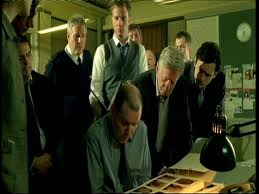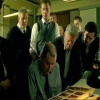Originally published by L.S. Media. February 20th 2012. 
L.S. Media Rating ****
Cast: Rupert Penry-Jones, Phil Davies, Steve Pemberton, Claire Rushbrook, Sam Stockwell, Ben Bishop, Hannah Walters, Jacqueline Roberts, Camilla Power.
The continuity announcer said before the start of the second part of the second story of Whitechapel, that some viewers may find some scenes upsetting, she might have well as ushered into the phrase, “and you’ll kick yourself for not realising who the killer is.” Such were the latent and subtle clues strewn throughout this final part that it was easy to forget the one fleeting and seemingly innocuous moment in the first episode where the murderer was revealed.
Whitechapel certainly dares to do what other detective dramas have failed to do over a consistently long period of time and that’s to show that the police in respects to the everyday are as human and as fallible as the rest of us. There are no easy answers, no clever moments where a U-turn can leave the viewer wondering painfully, a frown buried under perplexed thought and left scratching their heads and wondering where the vital clue was seen. In this drama, there are major missed turns, evidence left untouched because of their seeming lack of importance and in the thick of it all, an Inspector who is a flawed and neurotic, cleanliness obsessed as the rest of us.
In the three series of Whitechapel, Rupert Penry-Jones has been a constant joy to watch in comparison to his rather irritating portrayal of M.I.5 section leader Adam Carter in the B.B.C. drama Spooks. It’s arguably his best part on television since appearing in Russell T. Davies’s production of Casanova alongside David Tennant.
The main drama of this episode centres not only on the gruesome killings but also into the relationship between Penry-Jones’s D.I. Joseph Chandler and Phil Davies’s much put upon Detective Sargent. If ever there was a more likeable yet completely and utterly disconsolate policeman then Phil Davies tops the tree perfectly. There is no Northern refinement of Lewis, Morse’s long suffering sidekick; there is scant evidence that left to his own devises he would be as ineffective as the policemen who litter the pages of Agatha Christie. This is a policeman with a family who make demands on his time just as much as the hunt for a murderer in the East-End of London does.
This well written series only has one more two-part story to go and it will be a shame to say goodbye, hopefully not for long, to an absorbing television detective drama. It can only be hoped that the final story is just as creepy and just as enthralling!
Ian D. Hall
